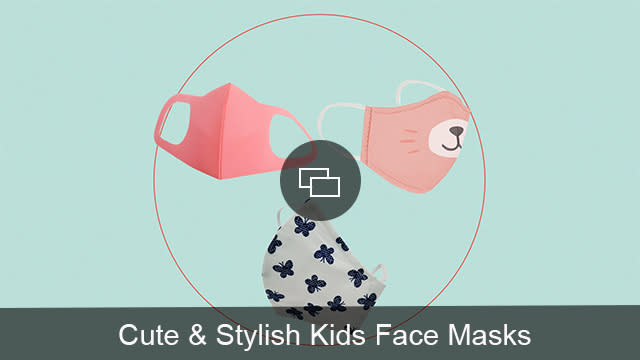How I Ended Up Co-Parenting With My Teen

I am not an essential worker — not like my husband, who works at a nearby grocery store. Still, looking back on every day since this pandemic started, it’s felt like I’ve been on the front lines. I’m helping my six-year-old daughter navigate Zoom classrooms, tackle new math problems, and read harder words. If it weren’t for COVID-19, she would be at school; I wouldn’t be right here, witnessing the joy and excitement she gets from learning. However, it’s become exhausting to take on so many new roles: coach, disciplinarian, teacher. I’m still torn over whether to send her back to a brick-and-mortar school environment, but I’m also wondering if I’ll have the strength to tackle all those roles all over again this fall.
Which is why I’ve ended up co-parenting my six-year-old…with my teen son.
More from SheKnows
My husband and I “hired” our 15-year-old to monitor his sister when I was recently offered a new job. He wasn’t too thrilled, either. I knew this was a risky proposition — one that could also adversely affect our relationship. But it was even riskier to hire someone from the outside, as our county inched towards the yellow zone in terms of COVID cases.
In quarantine, there were signs of personal struggle. How could my teen and I even relate to each other? He preferred to stay at home in front of his computer; I took his sister for walks in nature. He couldn’t see the point of FaceTiming with his friends and family; I encouraged him to stay in touch so he wouldn’t feel isolated.
Our marriage therapist thought that “hiring” our son was a fantastic idea. But I had to figure out how to discuss the partnering plan without causing our relationship to suffer. My smart, intuitive son quickly understood what this opportunity would mean to us financially. But just a few days in, and already he was back to moaning and groaning. I mean, what 15-year old is expected to stay perky and excited about getting tasked with four to five hours of childcare per day while also taking care of his own online learning needs?
Happy girl at camp @jandrdaycamp
A post shared by Dorit Sasson (@doritsassonwrites) on Jul 13, 2020 at 7:17am PDT
I wanted to be the first line of defense. But I didn’t want to become my teen’s enemy. I was walking a fine line. So I leveraged David Kozlowski’s encouraging Ted Talk on the “Parent Teenager Parenting Model” — even though his talk was pre-COVID, when parents weren’t expected to be coaches, disciplinarians, and teachers in addition to holding down their actual jobs.
“Partnering can help you build and strengthen your relationship with your teen,“ Kozlowski says in his talk.
The question was how to communicate this partnership effectively to my son, without causing more stress. So I established some partnering basics. I established expectations in the form of a “partnering agreement” — without getting too emotional. I explained to my son that this agreement’s success was based on our willingness to negotiate. Together, my husband and I lay the ground rules of our expectations: That he’d be sharing the role of caring for and monitoring his sister during the times I couldn’t, and that we were expecting him to be present — but not perfect.
A few days into our partnership, I found myself saying, “I know you’ve been having a rough time at home, not being able to see your friends, while monitoring your sister while I’m working. And I just want you to know that I’m here to talk about it.” No questions. No shaming. Just the willingness to stay open and communicate.
There are still times when I have to reach a compromise based on my son’s requests. Can he lower the number of times each morning he’s required to check in with his sister? Can she skip one of the creative activities assigned, since she already completed the educational ones? All these adjustments are accounted for in our agreement.
A post shared by Dorit Sasson (@doritsassonwrites) on May 28, 2019 at 1:36pm PDT
However, it still has been hard for him to keep on top of all the details of the job he was “hired” to do — particularly with the daily schedule changes. After all, he’s just a teenager, and I have to constantly remind myself of that.
Asking him to stay emotionally present has been probably the one task that takes the most conscious effort. Explaining how monitoring a six-year-old is not the same as staying emotionally present is an ongoing challenge. At the end of the day, I have to lower my expectations; after all, he isn’t the parent.
So, we explained the kinds of behaviors needed to help create a winning partnership. We encouraged him to be patient with his sister instead of scolding her — especially when she couldn’t always figure out the Zoom passwords. We reminded him of specific words to instill praise, like “you’re doing a great job with that reading assignment.” Kindness goes a long way.
I can’t say that this partnership is foolproof. It takes more work to ensure peace of mind for all of us. But it has been working — for us as a family, and for me at my new job.
What the world needs, especially now, is more cooperation and less conflict. Seeing my teenager as my partner, who will one day be my equal and my successor, is just plain good family business. Even in a global pandemic.
Protect little kids and teens alike with these stylish kids face masks.
Launch Gallery: The A to Z of 2018 Teen Slang, Deciphered
Best of SheKnows
Sign up for SheKnows' Newsletter. For the latest news, follow us on Facebook, Twitter, and Instagram.


